Keith Fowler
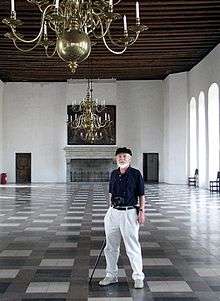
Keith Fowler (Keith Franklin Fowler; born February 23, 1939 in San Francisco) is an American actor, director, producer, and educator. He is a professor emeritus of drama and former head of directing in the Drama Department of the Claire Trevor School of the Arts of the University of California, Irvine (UCI),[1] and he is the former artistic director of two LORT/Equity theaters.[2][3][4]
Early career
Fowler began acting professionally with the Oregon Shakespeare Festival[5] (1958 and 1960), playing Antony in Julius Caesar and Lorenzo in Merchant (with OSF founder Angus Bowmer as Shylock), before leaving to study as a Fulbright scholar at the Shakespeare Institute in Stratford-upon-Avon, UK.[6]
In England, he directed the Midlands premiere of Brecht's Mother Courage. The production at the Stratford Hippodrome in spring 1961 led the town's veteran drama critic[7] to compliment the local troupe for daring a type of theater that Sir Peter Hall hesitated to bring to Stratford's just-founded Royal Shakespeare Company.[8]
Fowler attended the Yale School of Drama, studying under Nikos Psacharopoulos, director of the Williamstown Theater Festival, who chose Fowler to serve as his assistant, first as resident director of a theater in Holyoke, Massachusetts, where Fowler staged productions of J. B., by Archibald MacLeish, and Romeo and Juliet[9] and later as assistant director at Williamstown. In between Yale terms he directed a season of summer stock at the Belfry Theater in Williams Bay, Wisconsin, and staged a production of Hamlet for the San Francisco Shakespeare Festival. After Yale, Fowler joined the faculty of Williams College, and in the late 1960s he directed a highly stylized Macbeth for the El Paso Festival Theater, then acted and directed for the Asolo Theater in Sarasota, Florida.
Virginia Museum Theater
In 1969, he was appointed head of the Theater Arts Division of the Virginia Museum of Fine Arts and artistic director of the Virginia Museum Theater (VMT, now the Leslie Cheek Theater), and he undertook to guide VMT in becoming Richmond's first resident Actors Equity company[10] and a home for classics and new plays.

His productions, beginning with Marat/Sade (the first racially integrated company on the Virginia Museum's stage[11]), brought controversy[12] into the heart of Richmond's museum district but also drew increased attendance, more than doubling audiences between 1969 and the late 1970s.[13]
The "Fowler 'Macbeth'"
Dubbing the professional company VMT Rep, he drew national attention when in 1973 his second staging of Macbeth, a rather more realistic Stonehenge/historical version starring E.G. Marshall, led Clive Barnes of The New York Times to hail it as the "Fowler 'Macbeth.'"
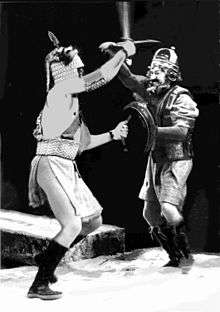
Barnes described the production as "splendidly vigorous, forcefully immediate... probably the goriest Shakespearean production I have seen since Peter Brook's 'Titus Andronicus'." Of Fowler, he wrote, "Virginia is lucky to have him."[14] Alfred Drake also joined the company in 1973 to direct the premiere of Richard Stockton's The Royal Rape of Ruari Macasmunde with Fowler in the lead role.[15] International attention arrived in 1975[16] when Soviet Cultural Consul Viktor Sakovich[17] provided coverage on Moscow Television for Fowler's English-language premiere of Maxim Gorky's Our Father (originally Poslednje).[18] Fowler subsequently produced the New York premiere of the Gorky drama at the Manhattan Theater Club.[19]
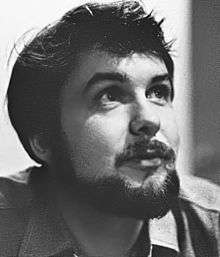
In expanding VMT's reach beyond the capital city, he created and hosted a radio program, Keith Fowler Presents..., over WRFK-FM, weekly readings from classic literature, each program focusing on selections from a major poet, dramatist, or novelist, from Chaucer to Shakespeare to Hawthorne.
In 1977, refusing museum pressure to censor his premiere of Romulus Linney's play Childe Byron,[20] Fowler resigned to serve his Yale alma mater as chief of directing for a year. His departure provoked a public outcry over an alleged pattern of censorship by the museum,[21] with some arts patrons supporting the museum administration[22] and many standing by Fowler, asserting, for instance, that "no one else can jump in and claim credit for what Dr. Fowler has done ... he stood up for what he knew was right."[23]
American Revels Company - Empire Theater
He returned to Richmond in 1978 with his associate director M. Elizabeth Osborn to lease the Empire Theater, fronting historically black residential Jackson Ward onto the majority business district, where together they founded the American Revels Company.[24]
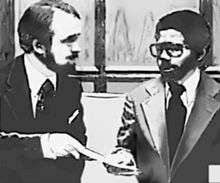
Revels attracted progressive support for appealing to both black and white communities in Richmond. Without intending to enter into Richmond's post-segregation politics, Fowler nevertheless found Revels becoming a rallying point in the late 1970s for re-balancing the two symbiotic communities through art. Funding through the box office and City Council support was affected directly by public favor in a city with a growing black majority.[25]
Unity Audience
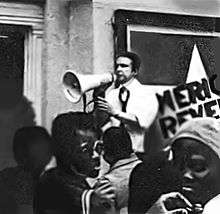
American Revels' first season[26] started with strong audiences, including full houses for A Christmas Carol and The Club in the thousand-seat Empire. Such peaks in attendance could not be sustained, however, when later play titles, including Othello and I Have a Dream, leaned toward those least likely to afford tickets—the African-American community. Fowler countered by offering free performances to neighboring residents.[27] The plan drew hundreds of African-American theater-goers and began to build a new sector of audience. In the summer of 1979, Richmond's City Council awarded the company a challenge grant,[28] and a patron stepped forward to raise matching funds by sponsoring a performance by entertainer Ray Charles to benefit Revels. The success of the fund drive propelled the company into a second season in which Revels dealt with racial issues head-on by presenting a satire entitled The Black and White Minstrel Show, a parody of the racially split City Council.[29][30] The season continued with works aimed at all of Richmond;[31] Revels found resurgent support for its balance of classics and new plays, as well as for an occasional special event, such as the celebratory Strutters’ Ball.
Still the costs of production were higher than the purses and wallets of the core audience could support. American Revels closed after two seasons.
The company had made its mark. Revels mounted fourteen productions between 1978 and 1980. By presenting actors of color and dramas with black themes—alongside classics and standard works—the company drew a sizable African-American audience to the live theater, many for the first time. Richmonders found that new plays and politically engaged works were not alien to their taste. Also, by resurrecting the long-dormant Empire Theater, the troupe pioneered the way for downtown professional theater, most significantly for Theatre IV, the current occupant of the Empire. For such a legacy, many Richmonders remember the company fondly, counting the Revels years as a time of theatrical excitement, and Fowler—in the words of Richmond Lifestyle magazine—as a "Rebel with a Cause."[27]
Teaching
After closing Revels, Fowler returned to acting at the Pittsburgh Public Theater and joined Yale classmate Robert Cohen, then chair of drama, on the faculty of the University of California, Irvine.
Among the research topics that drew Fowler's focus was the relationship between acting and hypnosis, through which he developed protocols for characterization.[32] In collateral studies he learned that actors are, as a group, significantly more susceptible to trance than the general population. Actors who display versatility playing characters are those who show a high "Femininity" index on the California Psychological Inventory (CPI).
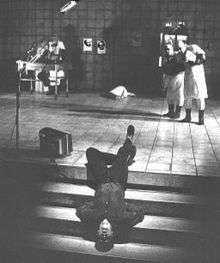
In 1984, he joined Jerzy Grotowski's "Objective Drama" project in the barn and fields south of the UCI campus, working with Grotowski day and night to explore the essential organons and yantras of performance.[33] He later memorialized the experience in American Theatre magazine.[34]
From 1996 to 2004, Fowler was the original director of ArtsBridge America, now expanded nationwide, a program created by then dean Jill Beck at UCI in 1996 for granting scholarships to university dance, drama, music, and studio art majors to reintroduce arts education into the depleted curricula of K-12 pupils in local schools.[35]
In 2011 Fowler completed a record tenure of over thirty years as head of directing for UCI's top-ranked drama program, mentoring hundreds of undergraduate and graduate directing students—many of whom have gone on to become award-winners, producers, and artistic directors of their own companies[36] His standards for choosing new students included a concern for diversity of training and experience, enrolling foreign students as well as non-traditional older students in the belief that students learn as much from peers, especially dissimilar ones, as from faculty.[37]
Fowler retired from active teaching in December 2015 and is now a professor emeritus.
Plan B vs. Plan A
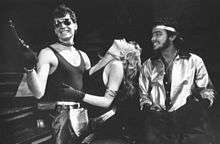
One of Fowler's teachings is that directors must be over-prepared to guide a production team in designing and rehearsing a show. Co-author of A Director's Guide, Janelle K. Eagle[38] points to his statement, "The notion of a modest Plan B to 'fall back on' is a mistaken concept," as a highlight of the Guide. Eagle finds the notion applying to a variety of fields, quoting again: "The magnificent exchanges for which one wishes, those that lead to real discovery and leaps into true art, can only occur spontaneously when all are ready, when sparks are struck right there in the moment with colleagues. That is Plan A."[39] Among Fowler's major productions at UCI have been Molière's Le Misanthrope, (translated by Robert Cohen), Sam Shepard's The Tooth of Crime, Anton Chekhov's Three Sisters and Uncle Vanya, Tom Stoppard's The Real Thing and Arcadia, Brecht and Weill's The Threepenny Opera,[1] Heiner Müller's Hamletmachine, and Fowler's own translation of Georg Büchner's Woyzeck.[40]
Personal life
Born in San Francisco's French Hospital[41] to Jack Franklin and Jacqueline Hocking Montgomery Fowler, Keith is a graduate of George Washington High and SF State. After residing for his first 21 years in San Francisco, he went to The Shakespeare Institute of the University of Birmingham, UK, and Yale University School of Drama for graduate work. He has lived in Stratford-upon-Avon, UK; New Haven, Connecticut; Williams Bay, Wisconsin; Holyoke and Williamstown, Massachusetts; El Paso, Texas; Sarasota, Florida; Warren, Ohio; Richmond, Virginia; Pittsburgh, Pennsylvania, Vienna, Austria; and Irvine, California. He is the father of two sons, Jeremy and Matthew, by first wife Janet Bell. He is currently married to Janice Elizabeth Byrd Fowler, and they reside in the University Hills neighborhood of Irvine, California.
Honors and awards
- Borden Prize, San Francisco State University
- BA magna cum laude, San Francisco State University
- Fulbright Scholarship, specializing in Elizabethan Staging at the Shakespeare Institute, UK
- Woodrow Wilson Fellowship, Yale University
- John Shubert Memorial Scholarship, Yale School of Drama
- DFA, Yale University
- Phoebe Award, "Best Direction," Childe Byron, Richmond (Virginia) Newspapers
- Drama-Logue Award, "Outstanding Direction," Bloody Poetry
- UC Irvine Award for Outreach Leadership (Artists-in-Training)
- ArtsBridge Award for "Leadership Excellence"
Bibliography
| Wikimedia Commons has media related to Keith Fowler. |
- Hypnotic Transformation: Three Studies of Theatrical Role-Playing by Keith Fowler in The International Journal of Clinical and Experimental Hypnosis, 1988, vol. XXXVI, No. 4.
- Precise functions of hypnosis in dramatic acting, by Keith Fowler, National Auxiliary Publication Service, 1986.
- "Who is he supposed to be?," by Keith Fowler, in Müller in America, American Productions of Heiner Müller, copyright 2003 by Castillo Cultural Center.
- "The Grotowski Papers," by Keith Fowler, in American Theater, January 2014.
References
- 1 2 "UC Irvine Drama Department Faculty :: Keith Fowler". Drama.arts.uci.edu. Retrieved 2013-04-27.
- ↑ Virginia Museum Theater, 1955-1980, "Twenty-Five Years of Service to the Commonwealth," 1980, 21
- ↑ Panhelas, William, "Fowler Resigns...," The Commonwealth Times, March 29-April 4, 1977
- ↑ Proctor, Roy, "Empire Leased for Theatrical Group," Richmond News Leader, Aug 24, 1978
- ↑ "Merchant of Venice (1958, Oregon Shakespeare Festival) :: Shakespeare in Performance :: Internet Shakespeare Editions". Internetshakespeare.uvic.ca. Retrieved 2013-04-27.
- ↑ "Eagles That Soar". Gwhs75thanniversary.com. Retrieved 2013-04-27.
- ↑ "Amateur Players break new ground with 'Mother Courage'," Stratford-upon-Avon Herald, April 21, 1961
- ↑ Gardiner, Edmund, "Pepys Behind the Scenes," Stratford-upon-Avon Herald, April 28, 1961
- ↑ Program of the Casino-in-the-Park Playhouse, summer 1963
- ↑ And a member of LORT, the League of Resident Theaters, the professional organization of professional repertory companies with Actors Equity contracts, --the Virginia Museum Theater was classed as a LORT "C" company.
- ↑ African-Americans had occasionally appeared in race-constrained parts, as maids and servants; Marat/Sade was the first VMT production to cast black performers in racially unspecified major roles--as Duperret and Cucurucu.
- ↑ See editorial, "The Thing at the Museum," Editorial Page Richmond News Leader, October 10, 1969
- ↑ "Theater Hits Record Sales..." Petersburg Progress-Index, July 22, 1975
- ↑ CLIVE BARNES Special to The New York Times (1973-02-12). "Stage - Fowler 'Macbeth' - A Vigorous Production Staged in Richmond The Cast - Article - NYTimes.com". New York Times. Retrieved 2013-04-27.
- ↑ Theatre Profiles, Vol. 1, Theatre Communications Group, 1973.
- ↑ Program of the Virginia Museum Theater Repertory Company, "Our Father," February 7–22, 1975
- ↑ Kass, Carole, "Play Prompts Praise..." in Richmond Times-Dispatch, Feb. 9, 1975
- ↑ Translated by William Stancil, VMT's Music director.
- ↑ Gussow, Mel (1975-05-10). "Stage - Gorky's Difficult 'Our Father' - A Family Split in Two Is Under Scrutiny - Article - NYTimes.com". Select.nytimes.com. Retrieved 2013-04-27.
- ↑ Rosenfeld, Megan, The Washington Post, Thursday, March 24, 1977
- ↑ Merritt, Robert, "Conflict of Ideals Key to Resignation of Theater Director," Richmond Times-Dispatch, March 31, 1977
- ↑ Stalnaker, Shirley R., "If She Desired 'Trash,' She Would See a Movie," in "Voice of the People," Richmond Times-Dispatch, April 1, 1977
- ↑ Pahnelas, William, "Fowler Resigns, Cites Artistic Differences," The Commonwealth Times, March 29-April 4, 1977
- ↑ A LORT "B" company
- ↑ Merritt, Robert, "Revels' 'Dream' Is Worth Wait...," Richmond Times-Dispatch, April 24, 1979, A-7
- ↑ Offering Fowler's version of A Christmas Carol, The Club, Holy Ghosts, by Romulus Linney, Shakespeare's Othello, and a drama of Martin Luther King, Jr., I have a Dream
- 1 2 Steger, Martha, "Keith Fowler: Rebel With a Cause, Virginia Lifestyle magazine, June/July 1979
- ↑ For $25,000 to be matched to $50,000; Steger.
- ↑ And offering excerpts of it on the steps of Richmond City Hall.
- ↑ Modeled after the The Minstrel Show or Civil Rights in a Cracker Barrel, premiered in 1967 by the San Francisco Mime Troupe.
- ↑ In addition to the Minstrel Show, the second season included Twelfth Night, Tales from the Vienna Woods, by Ödön von Horváth, American Buffalo, El Grande de Coca Cola, and Ashes of Soldiers. A co-production with the Haymarket Theater of Showboat was a bonus to subscribers. A special rhythm and blues dance concert, Strutters Ball, was added in mid-season to honor local black and white headliners, Larry Bland and Steve Bassett. A new play by Kevin Heelan, Hope I Hear it Again Sometime, concluded the year.
- ↑ Fowler, Keith, "Hypnotic Transformation" in The International Journal of Clinical and Experimental Hypnosis, 1988, vol. XXXVI, No. 4. See also National Auxiliary Publication Service.
- ↑ Slowiak, James, and Jairo Cuesta, Jerzy Grotowski, p. 59
- ↑ Fowler, Keith, "The Grotowski Papers" in American Theatre, January 2014, pp. 92–98.
- ↑ "ArtsBridge America Program " Lawrence University News". Blogs.lawrence.edu. 2005-03-24. Retrieved 2013-04-27.
- ↑ Distinguished former students of Fowler include
* Peter Anthony, director, OpenStage Theatre and Company, Fort Collins, Colorado;
* Constantine Arvanitakis, director, Athens Conservatoire, Greece;
* Trevor Biship, winner of awards for Jerry Springer...;
Stephen Burdman, artistic director, New York Classical Theatre, New York, New York;
* caryn morse desai, artistic director, International City Theater, Long Beach, California;
* Bryan Doerries, artistic director, Theater of War; author The Theater of War, Alfred A. Knopf, New York, New York 2015;
* Beth Gardiner, co-director, Three Day Hangover, New York, New York;
* José Cruz González, playwright and professor, California State University, Los Angeles;
* R. Michael Gros, dean and artistic director emeritus, Pacific Conservatory of the Performing Arts, Solvang, California;
* Allison Liddi-Brown, DGA Award winner, Los Angeles, California;
* Pamela Livingstone, artistic director, Hickory Community Theater, Hickory, North Carolina;
* Beth Lopes, director for New Swan Theater;
* Amanda McRaven, Fulbright Scholar, artistic director of Fugitive Kind, Los Angeles Ovation Award Winner for Outstanding Director of 2014;
* Teresa K. Pond, artistic director of Cyrano's Theater Company, Anchorage, Alaska; formerly artistic director, Mill Brook Playhouse, Pennsylvania;
* Roberto Prestigiacomo, artistic director, AtticRep Theater and professor, Trinity University, San Antonio, Texas;
* Rob Salas, artistic director, Davis Shakespeare Ensemble, Davis, California;
* Brian J. Sivesind, executive director, The Empty Space, Bakersfield, California;
* James Slowiak, co-artistic director, New World Performance Lab and professor, University of Akron, Ohio;
* Roger Smart, artistic director, Shattered Globe Theater, Chicago;
* Donna Soto-Morettini, dean emeritus of theater, Royal Conservatoire of Scotland (formerly Royal Scottish Academy of Music and Drama);
* Mark Valdez, executive director, Network of Ensemble Theaters, California;
* Joanne Yarrow, director artístico, Prometeo Teatro, Miami, Florida;
* Magdalena Zira, theater director Nicosia, Cyprus; etc.
- ↑ "UC Irvine Drama Department :: MFA in Directing :: Introduction". Drama.arts.uci.edu. Retrieved 2013-04-27.
- ↑ Conversation in Hoag Hospital 02/19/2012, followed by email from filmmaker and community activist Eagle to Fowler, 02/24/2012
- ↑ Fowler, Keith; Eagle, Janelle K. "A Director's Guide". Eee.uci.edu. p. 8.
- ↑ Müller in America, American Productions of Heiner Müller, copyright 2003 by Castillo Cultural Center
- ↑ The oldest existing hospital in the state of California, located at Geary Boulevard between 5th and 6th Avenues, now operated as a Kaiser-Permanente facility